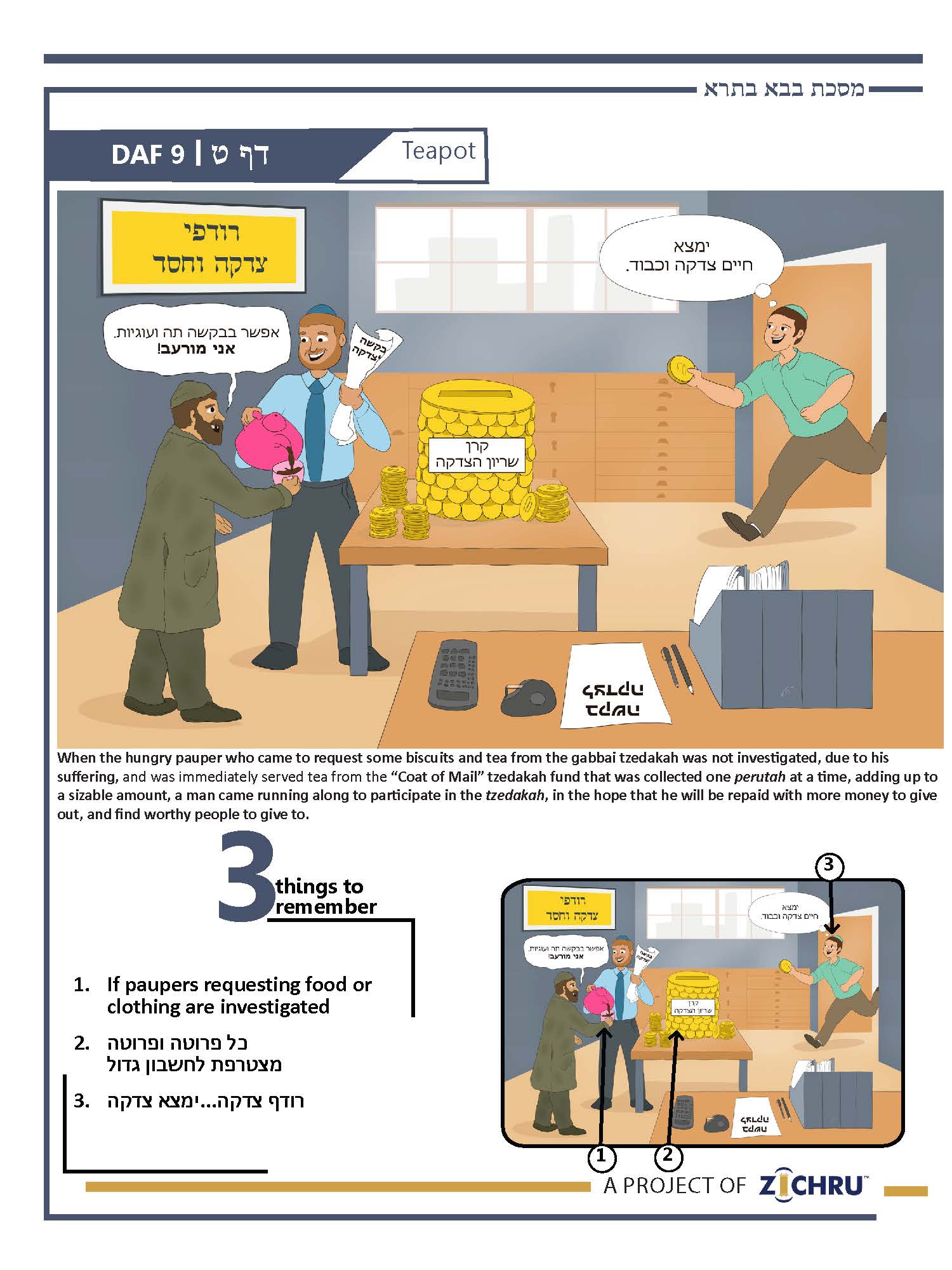Bava Basra - Daf 9
- Audio Timestamps
0:00 - The 3 Sugyos
2:57 - Review of 3 Sugyos
5:39- Siman
8:39 - 4 Blatt Back Chazarah
16:42 - Pop Quiz (Last 7 blatt)
For access to all Zichru resources including PDFs, and illustrations CLICK HERE
- If paupers requesting food or clothing are investigated
Rav Huna said: בודקין למזונות – We investigate poor people asking for food to verify their need, ואין בודקין לכסות – but we do not investigate those asking for clothing, rather we give them immediately. He offers a logical explanation: האי קא מבזי – this one requesting clothing disgraces himself by coming forward inadequately dressed, and his legitimacy is assumed, as opposed to those asking for food, who are not disgracing themselves, and are investigated. Rav Huna also provides a source from a passuk.
Rav Yehudah says the opposite, that applicants for clothing are verified, and those requesting food are not. He offers a logical explanation: האי קמצערא ליה – this one requesting food is suffering from hunger (if he is being truthful), so we do not delay providing him with food to investigate, but those requesting clothing are not physically suffering, and can await verification. He interprets the very passuk quoted by Rav Huna as proving his position. A Baraisa supports Rav Yehudah’s opinion.
- כל פרוטה ופרוטה מצטרפת לחשבון גדול
Rebbe Elazar explained the passuk: וילבש צדקה כשריון – And he wore charity like a coat of mail, to teach that just as with a coat of mail, כל קליפה וקליפה מצטרפת לשריון גדול – each and every scale combines together to create a large coat of mail, אף צדקה כל פרוטה ופרוטה מצטרפת לחשבון גדול – so too with tzedakah, each and every perutah given combines together to become a great total. Rebbe Chanina gave a different source: וכבגד עדים כל צדקותינו – And all our charitable acts are like a repulsive garment. Just as with a garment, כל נימא ונימא מצטרפת לבגד גדול – each and every thread combines to form a large garment, אף צדקה כל פרוטה ופרוטה מצטרפת לחשבון גדול – so too with tzedakah, each and every perutah given combines together to become a great total.
- רודף צדקה...ימצא צדקה
Rebbe Yitzchak quoted the passuk: רודף צדקה וחסד ימצא חיים צדקה וכבוד – He who pursues opportunities to do charity and kindness will find life, charity and honor. He asked, does this mean that by pursuing charity, he will become poor and require charity?! Rather, the passuk teaches: כל הרודף אחר צדקה – anyone who pursues charity, הקדוש ברוך הוא ממציא לו מעות ועושה בהן צדקה – Hashem provides him money, which he uses for charity. Rav Nachman bar Yitzchak said: הקדוש ברוך הוא ממציא לו בני המהוגנים לעשות להם צדקה – Hashem arranges for him worthy people for whom he does charity, כדי לקבל עליהם שכרו – in order for him to receive reward for helping them. This means to exclude from Rabbah’s explanation of Yirmiyah’s prayer, in which he asked Hashem that even when his enemies subdue their יצר הרע and seek to do charity, הכשילם בבני אדם שאינן מהוגנין – “make them stumble by sending them people unworthy of charity, כדי שלא יקבלו עליהן שכר – so they will not receive reward for them.” Rebbe Yehoshua ben Levi said, based on the above passuk: כל הרגיל לעשות צדקה – anyone who regularly performs charity, הויין לו בנים בעלי חכמה בעלי עושר בעלי אגדה – will have sons who possess wisdom, wealth, and knowledge of Aggadah.
Siman – Teapot
When the hungry pauper came to request some biscuits and tea from the gabbai tzedakah was not investigated, due to his suffering, and was immediately served tea from the “Coat of Mail” tzedakah fund that was collected one perutah at a time, adding up to a sizable amount, a man came running along to participate in the tzedakah, in the hope that he will be repaid with more money to give out, and find worthy people to give to.


